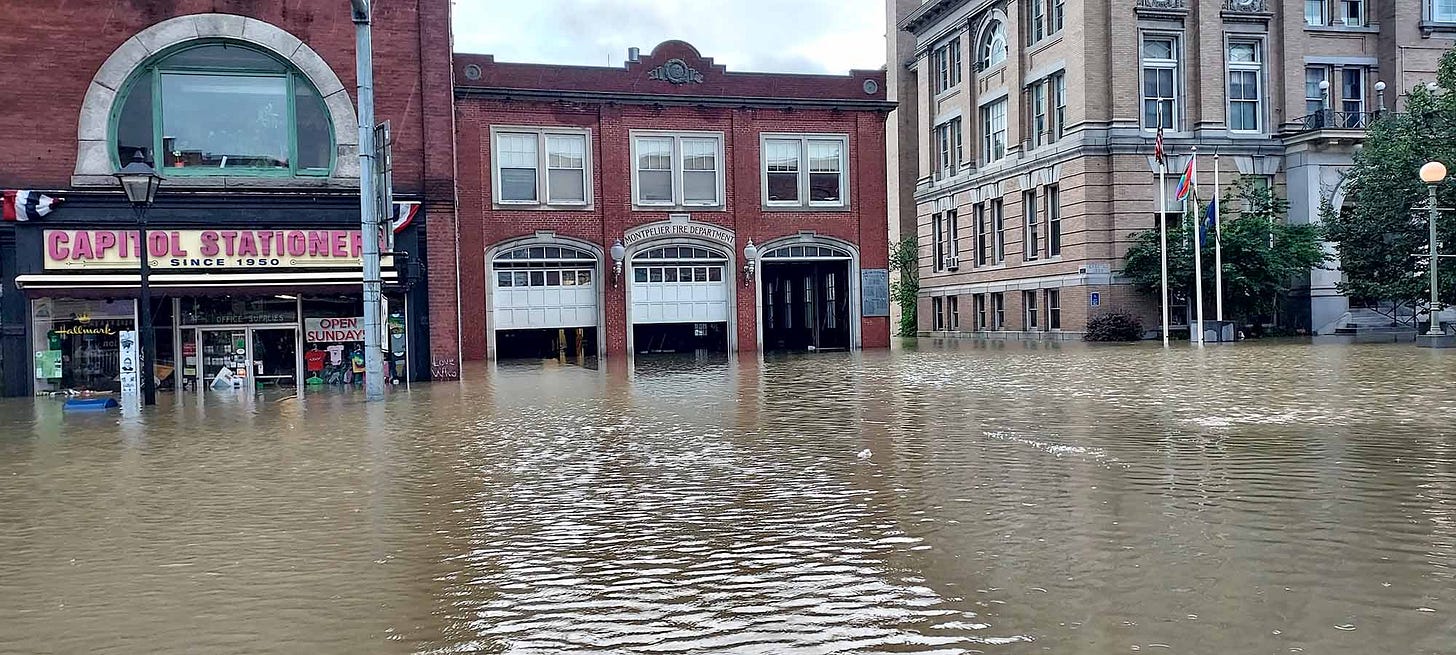Today is the one year anniversary of a historic flood that destroyed my town. It is remarkable how much we’ve bounced back. Almost all of the businesses that plan to come back have now come back (we’re still missing a post office, though). Basements and apartments have been gutted; roads have been restored. But some people are still displaced, and the shape of the river is still new and unfamiliar. And our trauma is surprisingly raw.
It does not help that it happened again today. Today, of all days. Not quite as high or as damaging in my town, but much worse in surrounding towns. Almost all non-interstate roads have closures; preschool is closed. The recovery celebration—imprudently titled “Flood the Streets with Art”—is postponed. The rain came too quickly with the rivers already high. The timing feels cruel. The collective strain is palpable. The rain was a remnant of Hurricane Beryl, which already caused far greater damage in the Caribbean, Mexico, Texas, and Louisiana.
Beryl is the strongest hurricane ever recorded at this point in the season. Climate disasters are our present and our future, and the physical and economic toll of these disasters is unprecedented. But I wonder: is anyone tracking the emotional toll? Just look at the greatest long-term costs of COVID. Are the climate adaptation plans taking into account our grief? Or our newfound weather-induced anxiety? Our fried nervous systems and fraying relationships?
I digress. You came here for a poem. I’ll save the rest of that soapbox for another day. Here is a poem that I wrote last summer, the week of the flood.
Catastrophic Flood Warning
Attention residents of this household: A Catastrophic Flood Warning is in effect From now until further notice After a summer “vacation” of napless, tantrum-filled days with zero recuperation time Mom’s ability to peacefully parent has reached maximum capacity With severe levels of childcare closures, family health crises, chaotic living conditions, untouched work deliverables, and unmet personal needs expected in the coming hours, her banks are apt to overflow As this is a historic event, our predictive models are limited in scope Some areas, such as The Wetlands of a Good Cry and the Someone Else to Suffer Alongside Spillway may be able to absorb a measure of flooding, however the threat to the underlying infrastructure of house, home and family should not be underestimated Take precautions, and if possible evacuate to higher ground Prioritize your safety Do not attempt to drive through emotional puddles of unknown depth Treat floodwaters as toxic: avoid contact with skin, mouth or eyes, and remember: The water may take longer than expected to recede
Here’s your somatic prompt for the week:
When your banks are ready to overflow—or perhaps they already have—take time to withdraw from the stimuli that got you here. Do whatever it takes to pause.
Lay down comfortably, with a pillow under your head if you like, and place something weighted on your upper abdomen, under your rib basket. A beanbag is ideal, but you could use a blanket with a book or yoga block on top.
Just breathe in and out your nose, and notice what it feels like to have the weight there. Let it bring attention to the diaphragm, which you can visualize drawing air in and out like a bellows. Focus on the breath, moving like waves.
Stay here for as long as you like. Aim for 10 minutes or more. When you are ready to move, do so slowly.
Honor your emotions. Make space for them to be felt. Look for a community in which to feel them. We won’t heal until we feel.
With light, life, and an extra dose of love,
Devon






